Table of Contents
ToggleDo Cats Like Sea Moss?
Sea moss has gained popularity recently as a superfood, lauded for its numerous health benefits for humans. But as a cat owner, you might wonder, do cats like sea moss? Is it safe for them to consume? This article will explore the relationship between cats and sea moss, covering its potential benefits, risks, and whether or not your feline friend might enjoy it.
What Is Sea Moss?
Sea moss, also known as Irish moss or by its scientific name Chondrus crispus, is a type of red algae that grows abundantly along the rocky coasts of the Atlantic Ocean, particularly in parts of Europe and North America. This marine plant has been harvested for centuries and is valued for its numerous health benefits and versatile uses.
Appearance and Habitat
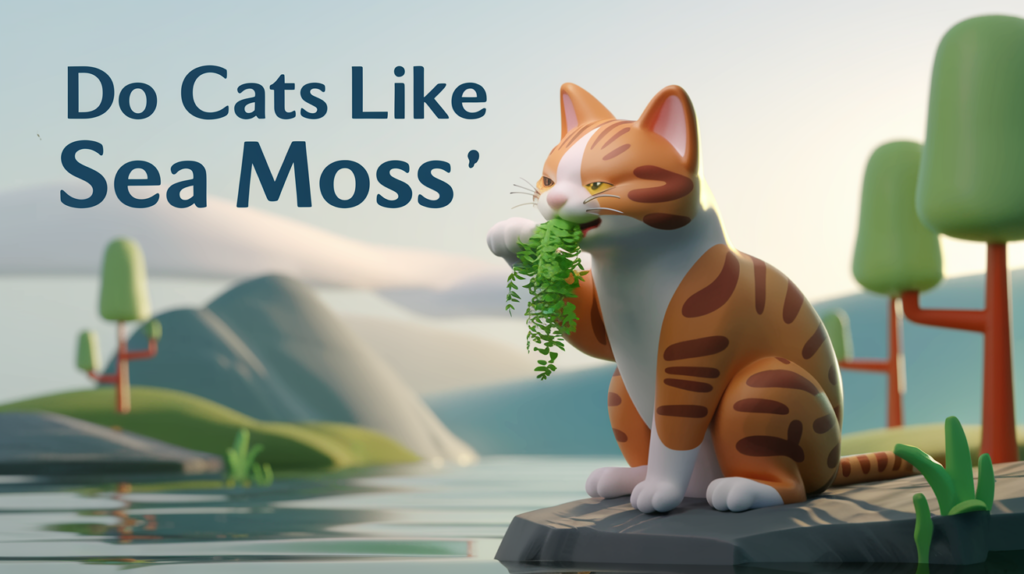
Sea moss typically appears as small, frond-like seaweed that varies in color from greenish-yellow to dark purple or red, depending on where it’s grown and the specific variety. It has a soft, almost spongy texture when fresh, and when dried, it takes on a slightly crisp, brittle form. Sea moss thrives in cool, nutrient-rich waters and is often found clinging to rocks in tidal pools and shallow waters.
Nutritional Composition
Sea moss is considered a superfood due to its rich nutritional profile. It contains a wide array of vitamins, minerals, and antioxidants, making it beneficial for human health. Some important nutrients in sea moss are:
- Vitamins: Sea moss is a good source of vitamins A, C, E, K, and several B vitamins, including B2 (riboflavin) and B9 (folate). These vitamins play crucial roles in maintaining healthy skin, immune function, and overall well-being.
- Minerals: One of the standout features of sea moss is its high mineral content. It contains significant amounts of iodine, which is essential for thyroid health, as well as calcium, magnesium, potassium, and iron. These minerals help keep bones strong, muscles working well, and blood flowing properly.
- Antioxidants: Sea moss is packed with antioxidants, which help protect the body from oxidative stress and inflammation. Antioxidants are important for reducing the risk of chronic diseases and promoting overall health.
- Carrageenan: Sea moss is a natural source of carrageenan, a gelatinous substance that is commonly used as a thickening agent in food products. Carrageenan is extracted from sea moss and used in a variety of foods, including dairy products, plant-based milk, and even toothpaste.
Health Benefits
The nutritional richness of sea moss translates into a variety of potential health benefits, especially for humans. Some of these benefits include:
- Immune Support: The combination of vitamins, minerals, and antioxidants in sea moss can help strengthen the immune system, making the body more resilient against infections and diseases.
- Thyroid Health: Iodine is essential for the production of thyroid hormones, which regulate metabolism, energy levels, and overall endocrine function. Sea moss, being rich in iodine, can support thyroid health, especially in individuals who may be iodine deficient.
- Digestive Health: Sea moss contains soluble fiber, which can aid in digestion by promoting healthy gut bacteria and regular bowel movements. The carrageenan in sea moss also has soothing properties that may help with gastrointestinal issues.
- Skin Health: The vitamins and minerals in sea moss, particularly vitamins A and E, are beneficial for skin health. They help maintain skin elasticity, reduce signs of aging, and may help with skin conditions like acne and eczema.
Culinary Uses
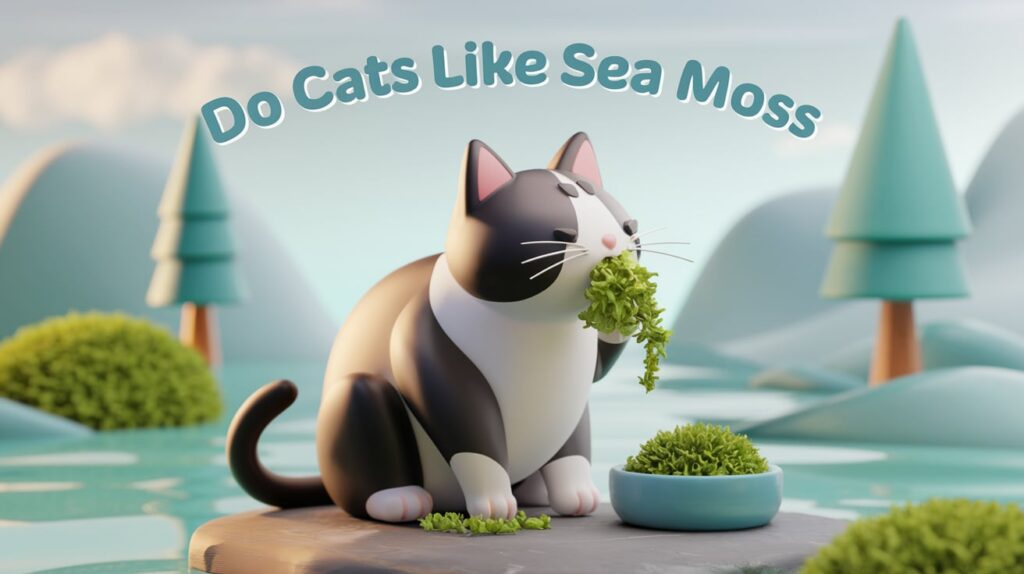
In addition to its health benefits, sea moss is also used in cooking and food preparation. It has a neutral flavor, which makes it a versatile ingredient in both savory and sweet dishes. Some common culinary uses of sea moss include:
- Thickening Agent: Sea moss is often used as a natural thickener in soups, stews, sauces, and desserts like puddings and jellies. When soaked and blended, it forms a gel-like consistency that can be used to add texture to recipes.
- Smoothies and Juices: Sea moss gel can be added to smoothies and juices for a nutritional boost. Its mild flavor blends well with fruits and vegetables, making it an easy addition to various beverages.
- Vegan and Vegetarian Dishes: Sea moss is popular in vegan and vegetarian cooking as a plant-based source of nutrients. It’s used in dairy-free cheese, ice cream, and other plant-based products to improve texture and nutritional content.
Traditional and Modern Applications
Traditionally, sea moss has been used in folk medicine for its healing properties. It was commonly consumed in the Caribbean and parts of Ireland as a remedy for colds, flu, and respiratory issues. The mucilaginous texture of sea moss was believed to soothe irritated mucous membranes and ease congestion.
In modern times, sea moss has seen a resurgence in popularity, particularly in health and wellness circles. It’s now available in various forms, including dried seaweed, powders, capsules, and pre-made gels, making it accessible to a wider audience.
Sustainability and Harvesting
Sea moss is generally considered a sustainable food source. It grows quickly in the wild and does not require fresh water, fertilizers, or pesticides to thrive. Harvesting sea moss is relatively low-impact, and when done responsibly, it can be a renewable resource. However, like all natural resources, it’s important to harvest sea moss sustainably to prevent overexploitation and damage to marine ecosystems.
Can Cats Eat Sea Moss?
When it comes to feeding your cat, it’s natural to wonder if certain human superfoods, like sea moss, are safe for them. Sea moss, known for its impressive nutritional content, has become a popular addition to human diets, but can cats eat sea moss? Let’s explore this question in detail.
Is Sea Moss Safe for Cats?
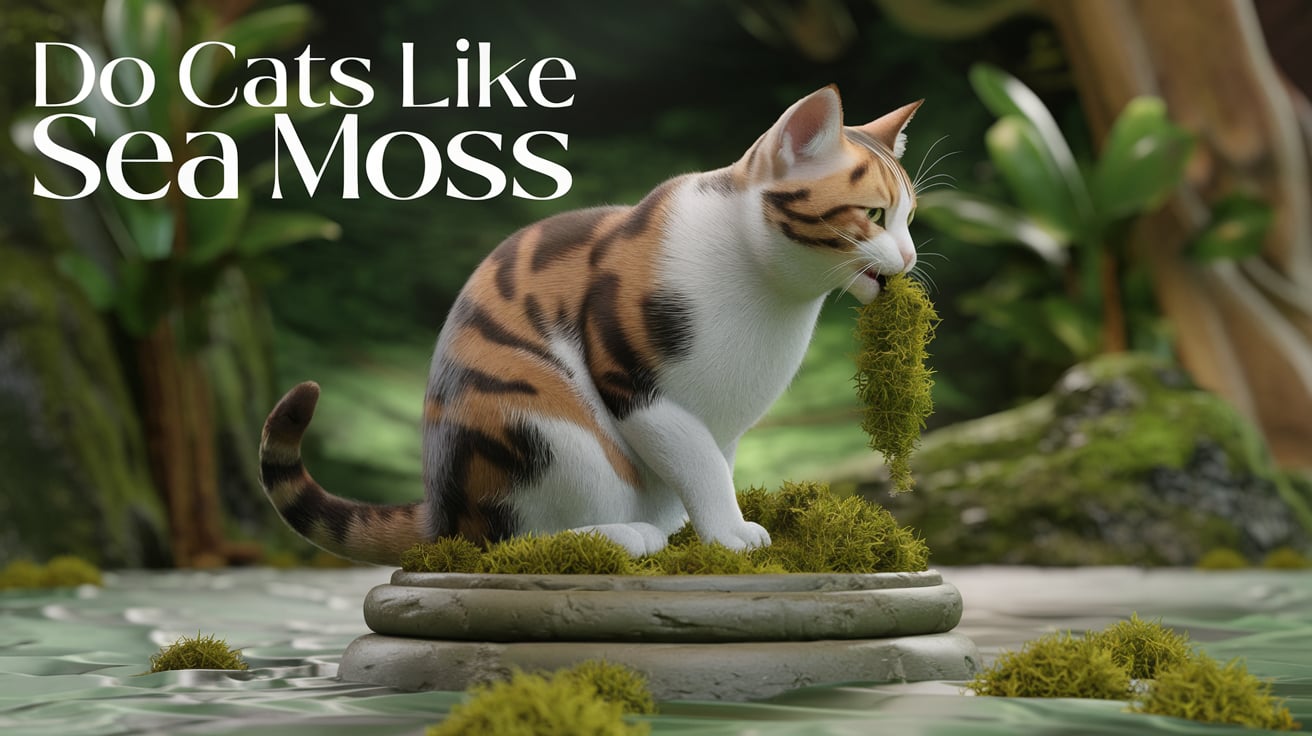
Sea moss is not toxic to cats, which means that if your cat happens to ingest a small amount, it is unlikely to cause immediate harm. However, just because it’s not toxic doesn’t necessarily mean it’s beneficial for your cat. Cats are obligate carnivores, meaning their diet is biologically designed to consist primarily of meat. Their digestive systems are optimized for processing animal proteins and fats, not plant material like sea moss.
Nutritional Content and Potential Benefits
Sea moss is rich in vitamins, minerals, and antioxidants that are beneficial for humans. Some of the nutrients in sea moss include:
- Iodine: Essential for thyroid function.
- Calcium: Supports bone health.
- Potassium: Important for muscle and nerve function.
- Vitamins A, C, E, and K: Offer various health benefits, including supporting the immune system and skin health.
While these nutrients are undoubtedly valuable, they are not typically required in the same form or amount for cats. Most high-quality commercial cat foods are already formulated to meet all of a cat’s nutritional needs, meaning there’s little to gain by adding sea moss to their diet.
Possible Risks of Feeding Sea Moss to Cats
Even though sea moss is not inherently harmful, there are several risks associated with feeding it to cats:
- Iodine Overload: Sea moss is very high in iodine. While iodine is necessary for thyroid health, too much can lead to hyperthyroidism, especially in older cats who are already prone to this condition.
- Digestive Issues: Cats are not equipped to digest large amounts of plant material. Feeding them sea moss could lead to gastrointestinal issues such as vomiting or diarrhea.
- Salt Content: Sea moss naturally contains salt, and excessive salt intake can be dangerous for cats. High salt consumption can lead to conditions like hypertension and kidney disease, which are serious health concerns in felines.
How to Offer Sea Moss to Your Cat Safely
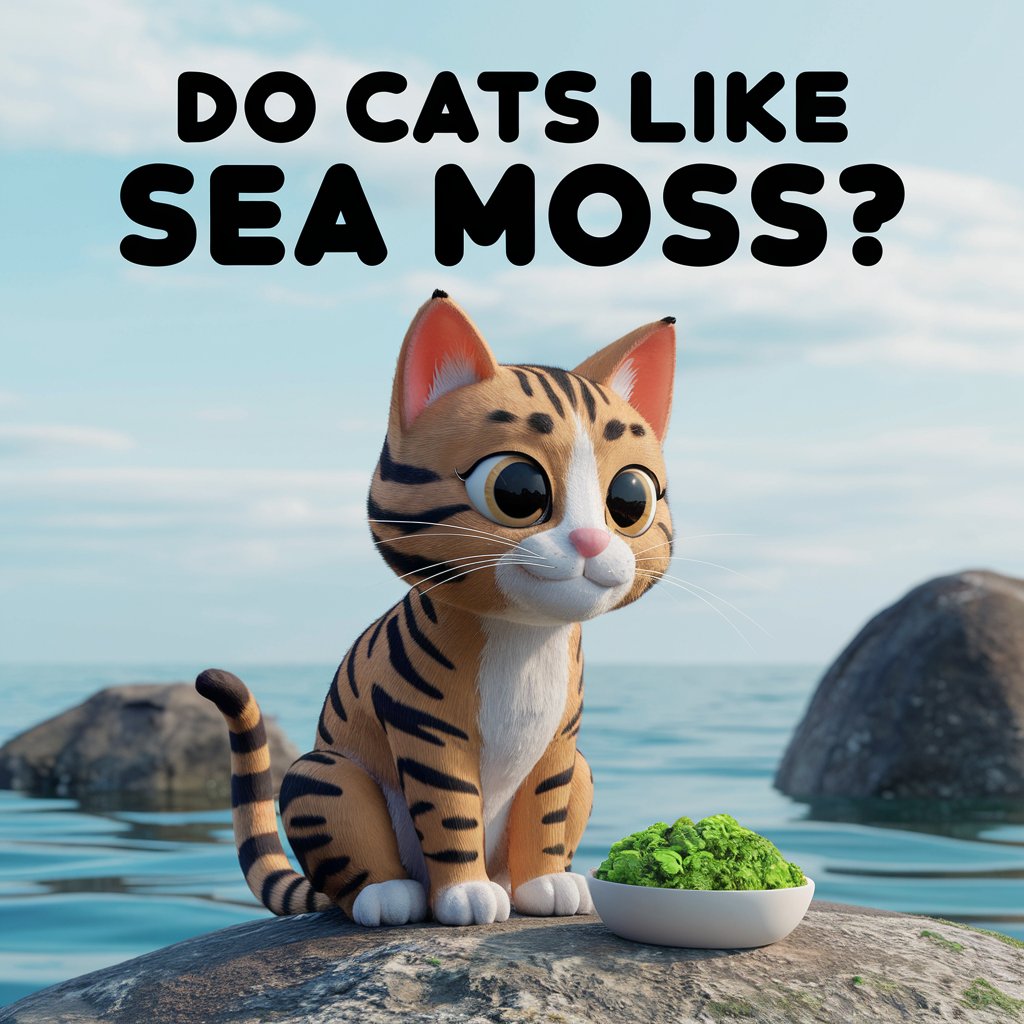
If you’re still considering giving sea moss to your cat, it’s important to do so with caution:
- Consult Your Veterinarian: Before introducing any new food or supplement to your cat’s diet, talk to your veterinarian. They can provide advice based on your cat’s specific health needs.
- Start with Small Amounts: If you decide to offer sea moss, start with a very small amount and observe your cat’s reaction. If they tolerate it well and seem to enjoy it, you can occasionally offer it as a treat.
- Plain Sea Moss Only: Ensure that the sea moss is plain and free from additives, seasonings, or preservatives, which could be harmful to your cat.
- Monitor for Reactions: After giving your cat sea moss, keep an eye out for any signs of discomfort, such as vomiting, diarrhea, or lethargy. If you see any bad reactions, stop using it right away and talk to your vet.
Alternatives to Sea Moss for Cats
If you’re looking to boost your cat’s nutrition, there are safer and more suitable alternatives to sea moss:
- Commercial Cat Food: High-quality cat food is formulated to meet all of your cat’s nutritional needs, ensuring they get the right balance of vitamins, minerals, and other nutrients.
- Cat-Specific Supplements: If your cat needs additional nutrients, there are supplements specifically designed for cats. These are a safer and more effective way to enhance their diet.
- Natural Treats: Consider offering your cat small amounts of cooked chicken, turkey, or fish as a treat. These options are more in line with a cat’s natural diet and are likely to be more appealing to them.
Nutritional Benefits of Sea Moss for Cats
While sea moss is not a necessary part of a cat’s diet, it does contain some nutrients that could be beneficial if consumed in very small quantities.
-
Iodine: Sea moss has a lot of iodine, which is important for how the thyroid works. Cats, like humans, need a certain amount of iodine to maintain a healthy thyroid gland.
- Vitamins: Sea moss contains vitamins A, C, E, and K, which are beneficial for overall health. Vitamin A supports vision and immune function, while vitamins C and E are antioxidants that help fight free radicals. Vitamin K is important for blood clotting.
- Minerals: The minerals in sea moss, such as calcium and magnesium, support bone health and muscle function. Potassium is also vital for proper nerve function.
However, it’s important to note that these nutrients should primarily come from a well-balanced cat food formulated specifically for felines. The small amounts found in sea moss are not enough to make it a significant source of nutrition for cats.
Do Cats Like the Taste of Sea Moss?
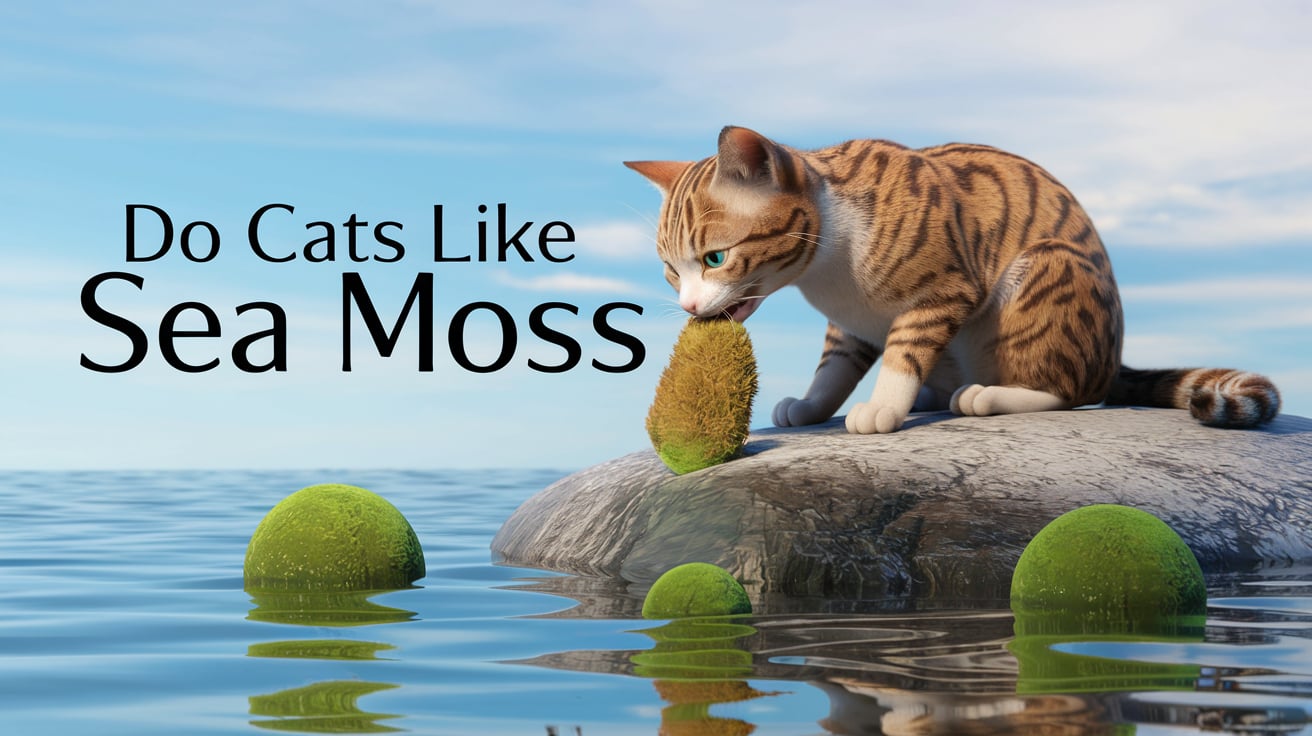
Now that we’ve established that sea moss is not harmful in small amounts, the question remains: do cats like sea moss? Cats are notoriously picky eaters, and their taste preferences lean heavily towards animal-based proteins. Sea moss has a very different texture and flavor profile compared to what cats are naturally inclined to enjoy.
While some cats might be curious about the texture of sea moss, others might turn their noses up at it. If you do decide to offer your cat a small amount of sea moss, don’t be surprised if they reject it. Cats’ taste buds are tuned to prefer meaty flavors, and sea moss is unlikely to appeal to their palate.
Potential Risks of Sea Moss for Cats
While sea moss can have some nutritional benefits, there are also potential risks associated with feeding it to cats.
- Iodine Overload: Sea moss is very high in iodine, and while iodine is essential, too much can lead to thyroid issues in cats. Hyperthyroidism, a condition where the thyroid gland is overactive, is a common concern in older cats, and an excess of iodine can exacerbate this condition.
- Digestive Issues: Cats are not designed to digest large amounts of plant material. Feeding your cat too much sea moss could lead to gastrointestinal upset, including vomiting or diarrhea.
- Salt Content: Sea moss naturally contains salt, and excessive salt can be harmful to cats. High salt intake can lead to conditions like hypertension and kidney disease, which are serious health issues in felines.
How to Safely Offer Sea Moss to Your Cat
If you’re still curious about offering sea moss to your cat, it’s crucial to do so in a safe manner. Start with a very small amount and observe your cat’s reaction. If they seem interested and don’t show any signs of digestive distress, it might be safe to offer it occasionally as a treat. However, it should never become a regular part of their diet.
- Consult Your Veterinarian: Before introducing any new food into your cat’s diet, it’s always best to consult with your veterinarian. They can guide whether sea moss is a good option for your specific cat.
- Use Plain Sea Moss: If you decide to try sea moss, make sure it’s plain and free from additives, seasonings, or preservatives, which can be harmful to cats.
- Monitor Your Cat: Keep an eye on your cat after giving them sea moss for the first time. If they show any signs of discomfort, such as vomiting, diarrhea, or lethargy, discontinue use immediately and consult your vet.
Alternatives to Sea Moss for Cats
If you’re looking for ways to boost your cat’s nutrition, there are other, more suitable options than sea moss.
- Cat-Specific Supplements: There are plenty of supplements designed specifically for cats that can provide additional vitamins and minerals. These are formulated to be safe and effective for feline consumption.
- High-Quality Cat Food: Investing in high-quality cat food that meets all of your cat’s nutritional needs is the best way to ensure they are getting everything they need for a healthy life.
- Natural Treats: If you want to offer your cat a natural treat, consider small amounts of cooked chicken, turkey, or fish. These are more aligned with a cat’s natural diet and are likely to be more palatable.
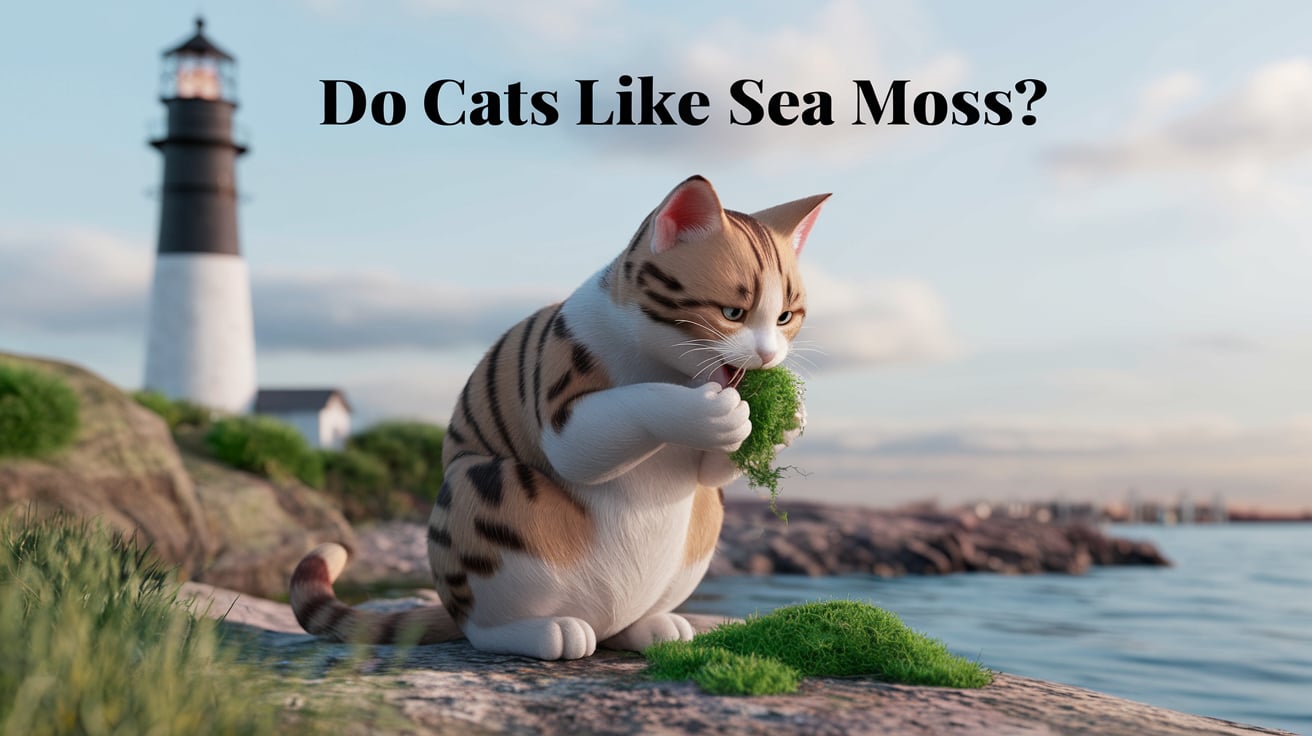
Conclusion: Do Cats Like Sea Moss?
In summary, do cats like sea moss? The answer depends on the cat. While some cats might be curious enough to try it, most are unlikely to be interested in the taste or texture of sea moss. More importantly, sea moss is not necessary for a cat’s diet and should be offered, if at all, in very small amounts and under the guidance of a veterinarian. There are safer and more appropriate ways to ensure your cat is receiving the nutrients they need.
FAQs: Do Cats Like Sea Moss?
Is Sea Moss Good for Cats?
Sea moss is not toxic to cats, but it doesn’t offer significant benefits and may cause digestive issues or iodine overload. Consult your vet before giving it to your cat.
Is Sea Moss Good for Pets?
Sea moss can be beneficial for some pets in small amounts, but it’s not necessary for most. Always check with your vet before adding it to your pet’s diet.
Do Animals Eat Sea Moss?
In the wild, most animals do not seek out sea moss as food. Domesticated pets like cats and dogs typically do not eat sea moss naturally.
When Not to Use Sea Moss?
Avoid using sea moss if your pet has thyroid issues, a sensitive stomach, or is already on a balanced diet. Always consult your vet before use.
RELATED ARTICLE:
Are Spider Plants Toxic to Cats?

Welcome to Hypocats.com! I’m Khawar Akhtar, a passionate writer dedicated to all things feline. With a deep love for cats and a keen interest in their health, diet, and training, I strive to provide cat owners with valuable insights and practical advice to enhance their furry friends’ well-being. My goal is to share my expertise and enthusiasm for our whiskered companions, helping them lead happier, healthier lives. When I’m not writing, you’ll find me spending quality time with my Russian Blue cat, enjoying the simple joys that come with being a cat lover. Thank you for visiting Hypocats.com—I hope you find the information here as helpful and inspiring as I do!
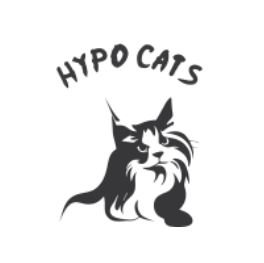
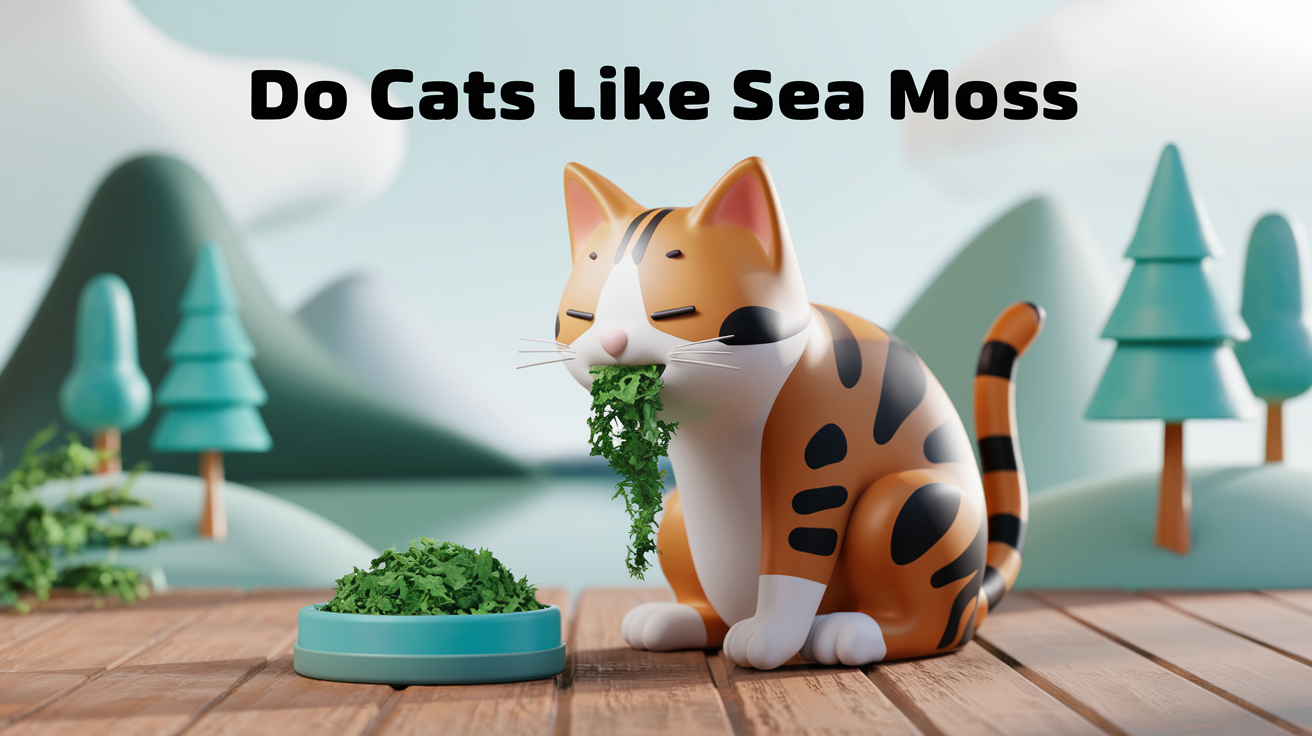
Leave a Reply